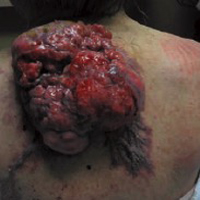A lobulated mass on the upper back with prominent vasculature: A giant basal cell carcinoma

Accepted: 11 February 2021
HTML: 701
All claims expressed in this article are solely those of the authors and do not necessarily represent those of their affiliated organizations, or those of the publisher, the editors and the reviewers. Any product that may be evaluated in this article or claim that may be made by its manufacturer is not guaranteed or endorsed by the publisher.
Basal cell carcinoma (BCC) is characterized by slow but locally invasive growth. Although there is low metastatic potential, if not treated early, these skin cancers can lead to significant morbidity and mortality. In this case report, we present a man with a neglected BCC that developed into what is termed a giant BCC or one that is greater than 5 cm. This tumor was discovered only upon workup of orthostatic lightheadedness and iron deficiency anemia. Although rare, basal cell carcinoma must be included on the differential of a large cutaneous lesion and may be a source of significant blood loss.
2. Zoccali G, Pajand R, Papa P, et al. Giant basal cell carcinoma of the skin: literature review and personal experience. J Eur Acad Dermatol Venereol. 2012;26(8):942-952. [PMID: 22211959].
3. Archontaki M SS, Korkolis DP, Arnogiannaki N, et al. Giant Basal cell carcinoma: clinicopathological analysis of 51 cases and review of the literature. Anticancer Res. 2009;29(7):2655-2663. [PMID: 19596942].
4. Desmond B, Boudreaux L, Young J. A rare case of super giant basal cell carcinoma. JAAD Case Rep. 2015;1(5):280-282. [PMID: 27051753].
5. Snow SN, Sahl W, Lo JS, et al. Metastatic basal cell carcinoma. Report of five cases. Cancer. 1994;73(2):328-335. [PMID: 8293396].
PAGEPress has chosen to apply the Creative Commons Attribution NonCommercial 4.0 International License (CC BY-NC 4.0) to all manuscripts to be published.





 https://doi.org/10.4081/dr.2021.9046
https://doi.org/10.4081/dr.2021.9046



